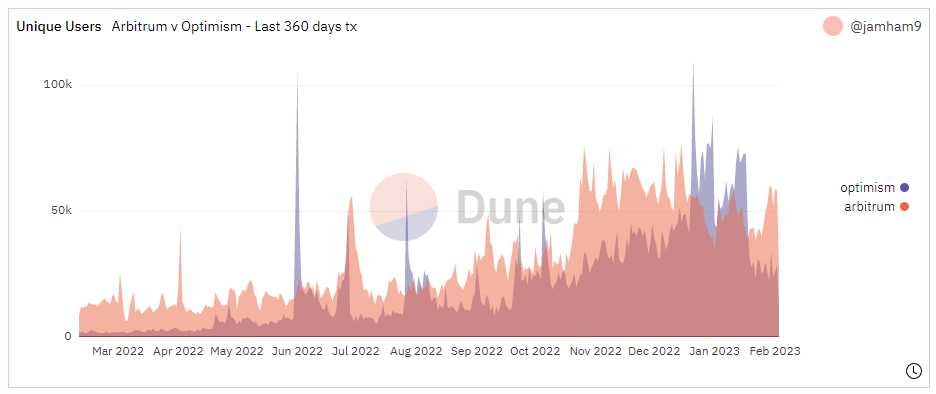A monthly review of what's happening in the crypto markets enriched with institutional research on the most important topics in the industry in cooperation with the Swiss digital asset specialist, 21Shares AG.
Slowing inflation in the U.S. turned market sentiment in favor of risk assets like cryptocurrencies - despite headwinds from the bankruptcy of Genesis and a criminal lawsuit against Bitzlato. Over the past 30 days, Bitcoin (BTC) and Ethereum (ETH) have risen nearly 40% and 30%, respectively. The outlier was Solana (SOL), up 140%, due in part to the hype of the meme token "BONK." Optimism stood out in the scaling solutions space, rising 132%. As for decentralized financial applications (DeFi), the token price of the "Staking-as-a-Service platform" Lido rose 117% last month.

- Former CEO of troubled crypto exchange FTX pleads not guilty and crypto lender Genesis files for bankruptcy,
- Ethereum Shanghai Upgrade still on schedule, Polygon zkEVM mainnet launching soon, and Fantom to introduce account abstraction in its next upgrade.
- Liquid staking protocols experience tremendous growth, DeFi continues to embrace the onboarding of Real World Assets (RWAs).
- NFT marketplaces and GameFi protocols continue migrating to Polygon; Seoul is launching a metaverse for its public services by 2026.
Ether (ETH) becomes deflationary

The mechanism is similar to Bitcoin's inflation halving every 4 years (also known as halving). The fact that Bitcoins native, immutable, underlying technology programmatically lowers inflation is very revealing of the core value proposition as a store of value. Similar to physical gold, the critical factor is the scarcity of the asset.
Macroeconomic environment remains tough
Inflation cooled in the U.S. in December and stands at 6.5% year-on-year. However, inflation has skyrocketed in other countries around the world such as Argentina (95%), Pakistan (25%) and Egypt (22%). The World Bank called this the slowest global economic growth in three decades. At the same time, the escalation of the Russian-Ukrainian war increased in the last week of January, when countries like the U.S. and Germany finally decided to arm themselves. Ukraine is to be supported in its fight against Russia with tank shipments for the time being.
The unfavorable environment continues to negatively impact the crypto industry. Genesis was the next company to file for Chapter 11 bankruptcy protection, revealing that it holds less than $500 million in assets. Meanwhile, the largest creditor alone reported a claim for $765 million. The lender's parent company, Digital Currency Group (DCG), has suspended its quarterly dividends to weather the market environment.
Crypto exchanges remain controversial
The Federal Reserve, the Federal Deposit Insurance Corporation (FDIC), and the Office of the Comptroller of the Currency (OCC) issued a joint statement warning banks about the risks associated with digital assets. The statement primarily reiterated that cryptocurrencies have been volatile over the past year due to the exposure of vulnerabilities and fraud. In related news, the former CEO of insolvent crypto exchange FTX, Sam Bankman-Fried, pleaded not guilty to eight charges; his case is scheduled to be decided in October. The U.S. Attorney's Office in Manhattan tasked an FTX task force to track down stolen funds. $5 billion of that was recovered in liquid cryptocurrencies.
To the dismay of the SEC, Binance.US received the first court approval for its acquisition of Voyager. After the court hearing scheduled for March, Binance.US will buy Voyager's assets and refund users 51% of their investments. Binance also appeared in the US Department of Justice's "major international cryptocurrency enforcement action" in which the founder of Hong Kong-registered crypto exchange Bitzlato was arrested. The company is accused of laundering $700 million in illicit funds. Around half of this is said to have been transacted through Binance.
Layer 2 networks gain momentum
The Optimism network launched the first phase of its most significant upgrade to date on Jan. 12. The Layer 2 solution activated what it calls the Bedrock upgrade, a series of architectural updates to the rollup chain. The process began Thursday with the migration of the Goerli test network to the Bedrock network. As a reminder, scaling solutions are either optimistic or zk-based. Optimistic rollups assume transactions are valid and provide node operators with a window to submit fraud proofs. Meanwhile, zk-based rollups use calculated verification with zero-knowledge technology for faster but more intensive transactions. Optimism, as the name suggests, is part of the optimistic rollup stack.

From this perspective, both Arbitrum and Optimism outperformed Ethereum's daily transactions in the second half of January. Although progress was driven by a number of network improvements to both networks, Optimism's daily transactions suffered a sharp drop after completing its "quests." Reinforcing our thesis that Arbitrum should be kept a close eye on. After all, the Layer 2 solution was able to secure organic traction and a loyal user base for its ecosystem without exorbitant incentives in the form of token issuance.
Lido becomes the largest DeFi protocol
Lido Finance displaced MakerDAO to become the largest DeFi project measured by total value locked (TVL) assets. The leading liquid-staking derivatives (LSDs) protocol dethroned the legacy money market protocol, while the vertical continues to gain momentum due to enthusiasm for the Ethereum Shanghai Upgrade. Staking withdrawals on Ethereum will likely be possible by March this year as part of the next major update.
Liquid Staking packages staked ETH into a synthetic derivative form that can be used simultaneously via DeFi primitives such as lending. At the same time, the network is secured without disrupting users' access to their capital. Competitors Frax, RocketPool, StakeWise, and StaderLabs also saw significant increases of 120%, 93%, 102%, and 250%, respectively.





